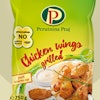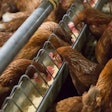
A Belgian company at the center of the crisis involving insecticide residues in eggs last year has announced it is bankrupt, and a new Dutch report on the investigation highlights problems in the country’s food safety system.
Almost one year ago, in late July of 2017, traces of the anti-parasitic chemical, fipronil, were detected in eggs from seven Dutch producers. The investigations that followed led to the recall of vast numbers of eggs from the shelves of retailers across the European Union and beyond. It emerged that fipronil, which is not permitted for use in food-producing animals in the EU, had been included in products to control red mites. These parasites suck blood from their hosts, causing irritation to the birds, which can lead to lower egg production and even mortality in hens, in extreme cases.
Repercussions from the detection of fipronil in eggs were felt around the world, as food safety agencies carried out investigations into products imported from the EU, particularly from The Netherlands and Belgium.
Fallout continues to be felt from the case.
Impact in Belgium
The Belgian-based company that supplied the chemical to two Dutch egg farms, Agro Remijsen, has recently declared bankruptcy. The firm belongs to Patrick Remijsen, who also owns Poultry-Vision, reports Brussels Times. With a judicial investigation still on-going, the company has been sued for “millions of Euros.”
Belgium’s food safety agency, FAVV-AFSCA, put out a statement last month, confirming that it has put in place a number of measures to detect any further use of banned biocides in the poultry industry. These focus on monitoring at the farm level, but products destined for export are also included.
Testing has been carried out on all farms since the start of this year, and covered fat and liver samples of chickens, as well as eggs.
So far, no signs of the banned products have been detected, the agency reports.
FAVV-AFSCA CEO, Herman Diricks, stated that he has been in contact with the Dutch authorities as more fipronil-contaminated eggs were found in Germany last month, leading to the recall of around 73,000 eggs that had been produced in The Netherlands from supermarket shelves.
In May this year, FAVV-AFSCA said it was cooperating with the authorities after its offices were raided by prosecutors in connection with last year’s incident of fipronil contamination of eggs.
Dutch report critical of farmers, food safety agencies
The widespread contamination of table eggs with fipronil in 2017, and the resulting response from the Dutch Food and Consumer Safety Authority, NVWA, caused “agitation in the food industry and uncertainty among consumers,” according to a report into the incident recently published by the Dutch government.
Investigations by a specially commissioned group concluded that insufficient safeguards were implemented by the companies involved in the egg chain at the time of the contamination with fipronil. Furthermore, according to the report, farmers and their representatives were unaware of the relevant regulations, while at the same time appearing to ignore the known risks of using unauthorized methods to control the parasites.
Once evidence of the incident emerged, it became clear that most farms were unprepared for such as food safety issue. No steps were taken immediately to stop supplying contaminated eggs from the market, or to withdraw affected product.
This lack of action puts into question the credibility of the NVWA, according to the report, whose function is the public monitoring of food safety. Monitoring of the egg industry in this regards, however, was undertaken by a private body, the Dutch Egg Control Authority, NCAE. A separate body covers the organic egg sector.
NVWA was also criticized for not carrying out its responsibilities for food safety after a request from the Belgian authority, FAVV, for the Dutch authority to investigate Chickfriend, supplier of the fipronil-containing red mite chemical. Generally, the NVWA was not well prepared for a food safety crisis, according to the commission.
The Dutch ministries involved — those of public health and agriculture — appear to have underestimated the scale and severity of the incident, and failed to communicate accurate information to the outside world in a timely manner, says the report.
In its recommendations, the commission says egg companies and their directors must give top priority to developing a credible system of self-regulation for food safety issues. It adds that the NVWA needs to integrate food safety more “visibly and unambiguously within the organization.” To do so and to handle incidents more quickly, more resources need to be made available to the agency.


















